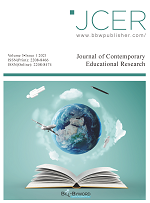Abstract
This research explores emerging concepts of tourism education, training, and entrepreneurship development. Nowadays, the discourses on this theme have been growing in both developed and developing countries, especially to reduce unemployment rates through the education of young people. For this purpose, this study uses secondary data sources to analyze individual rationality and the creativity of educated young people for entrepreneurship development in the business sector. The analytical framework begins from the investigation of the tourism industry and the processes for empowering those people since tourism industry is considered as one of the agents of economic changes in developing countries, such as Nepal. However, skilled and trained manpower are required to operate well. The main theme of this study is that the aforesaid manpower can be developed with entrepreneurship skills by providing education and training in this business. This study entirely agrees that once the tourism industry is well run by removing the hurdles seen in this sector, there would be an increase in employment opportunities and a raise in the country’s revenue in addition to solving many other social problems.
References
Airey D, 2015, 40 Years of Tourism Studies: A Remarkable Story. Tourism Recreation Research, 40(1): 6-15.
Airey D, Nightingale M, 1981, Tourism Occupations, Career Profiles and Knowledge. Annals of Tourism Research, 8(1): 52-68.
Airey D, Tribe J, 2005, An International Handbook of Tourism Education, Elsevier, United Kingdom.
Andrews S, 2007, Introduction to Tourism and Hospitality Industry, Tata McGraw-Hill Publishing Co., New Delhi.
Chaskar A, 2009, Doing Research in Literature and Language (Researcher Companion), Vaibhav Publications, Pune.
Manente M, Cerato M, (eds) 1991, Promoting Destinations Beyond the Year 2000 Opportunities and Threats, in Brackenbury M, From Destination to Destination Marketing and Management – Designing and Repositioning Tourism Products, CISET/University of Venice Press, Venezia, 45-48.
Barr T, 1990, From Quirky Islanders to Entrepreneurial Magnates: The Transition of the Whitsundays. Journal of Tourism Studies, 1(2): 26-32.
Butler RW, 1980, The Concept of a Tourist Area Cycles of Evolution: Implications for Management of Resources. Canadian Geographer, 24(1): 5-12.
Cobbinah PB, Black R, Thwaites RB, 2015, Biodiversity Conservation and Livelihoods in Rural Ghana: Impacts and Coping Strategies. Environmental Development, 15: 79-93.
Cooper C, Shepherd R, 2014, The Relationship Between Tourism Education and the Tourism Industry: Implications for Tourism Education. Tourism Recreation Research, 22(1).
Cooper C, Westlake J, 1989, Tourism Teaching into the 1990s. Tourism Management, 10: 69-73.
Echtner CM, 1995, Tourism Education in Developing Nations: A Three-Pronged Approach. Tourism Recreation Research, 20(2): 32-41.
Dahles H, Bras K, 1999, Tourism and Small Entrepreneurs: Development, National Policy, and Entrepreneurial Culture: Indonesian Cases. Cognizant Communication Corporation, New York.
EIESP, 1991, Education for Careers in European Travel and Tourism. A Study Commissioned by the American Express Foundation. European Institution of Education and Social Policy, Paris.
Faulkner B, 2000, The Future Ain’t What It Used to Be: Coping with Change, Turbulence and Disasters in Tourism Research and Destination Management. Griffith University, Gold Coast.
Gonnsen E, 1981, The Spatio-Temporal Development of International Tourism: Attempt at a Centre-Periphery Model, SAGE Publication, London.
Gracia S, Rachel D, 2010, Sustainable Tourism in Island Destinations, Earthscan, London.
Haywood KM, 1989, Managing Word-of-Mouth Communications. Journal of Service Marketing, 3(2): 55-67.
Ritchie JRB, Hawkins D, (eds) 1992, A Conceptual Model of the Education/Employment Interface for the Tourism Industry, in Haywood KM, Maki K, World Travel and Tourism Review, CAB, Oxford, 237-248.
Jafari J, 1990, Research and Scholarship: The Basis of Tourism Education. Journal of Tourism Studies, 1(1): 407-429.
Jafari J, Ritchie B, 1981, Towards a Framework for Tourism Education. Annals of Tourism Research, 8: 13-33.
Koh KY, 1996, The Tourism Entrepreneurial Process: A Conceptualization and Implications for Research and Development. The Tourist Review, 51(4): 24-41.
Laws E, Faulkner B, Moscardo G, (eds) 1998, Planning for Stability and Managing Chaos: The Case Of Alpine Ski Resorts, in Lewis R, Green S, Embracing and Managing Change in Tourism: International Case Studies, Routledge, London, 138-160.
Mathieson A, Wall G, 1982, Tourism: Economic, Physical and Social Impacts, Longman, London.
Neblett J, 2000, Linking Development, Indigenous Entrepreneurship and Tourism, with Special Reference to Barbados. Geography Online, 1(2).
Parsons D, Cave P, 1990, Developing Managers for Tourism, Nedo, London.
Sears GJ, Bara VV, 2011, Toward a Multistage, Multilevel Theory of Innovation. Canadian Journal of Administrative Sciences, 28(4): 357-372.
Shaw G, Williams AM, 2004, Tourism and Tourism Spaces, SAGE Publication, London.
Ioannides D, Debbage KG, (eds) 1998, Entrepreneurship and Small Business Culture and Tourism Development, in Shaw G, Williams AM, The Economic Geography of the Tourist Industry: A Supply-Side Analysis, Routledge, London.
